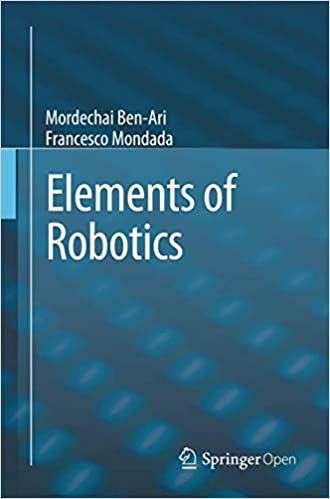
|
FreeComputerBooks.com
Links to Free Computer, Mathematics, Technical Books all over the World
|
|
- Title: Elements of Robotics
- Author(s) Mordechai Ben-Ari and Francesco Mondada
- Publisher: Springer; 1st ed. 2018 Edition; eBook (Creative Commons Licensed)
- License(s): CC BY 4.0
- Hardcover/Paperback: 324 pages
- eBook: PDF Files
- Language: English
- ISBN-10: 3319625322
- ISBN-13: 978-3319625324
- Share This:

|
This book bridges the gap between playing with robots in school and studying robotics at the upper undergraduate and graduate levels to prepare for careers in industry and research. Robotic algorithms are presented formally, but using only mathematics known by high-school and first-year college students, such as calculus, matrices and probability. Concepts and algorithms are explained through detailed diagrams and calculations.
About the Authors- Mordechai (Moti) Ben-Ari is with the Department of Science Teaching at the Weizmann Institute of Science.
- Robotics and Robot Programming
- Machine Learning
- Deep Learning and Neural Networks
- Artificial Intelligence
- Embedded Systems
 Similar Books:
Similar Books:
-
 Cognitive Robotics (Angelo Cangelosi, et al)
Cognitive Robotics (Angelo Cangelosi, et al)
Covering the challenges of building AI-powered intelligent robots inspired by natural cognitive systems. offering the first comprehensive coverage of building robots inspired by natural cognitive systems.
-
 Foundations of Robotics: Approach with Python and ROS
Foundations of Robotics: Approach with Python and ROS
This book introduces key concepts in robotics in an easy to understand language using an engaging project-based approach. It covers contemporary topics in robotics, providing an accessible entry point to fundamentals in all the major domains.
-
 Modern Robotics: Mechanics, Planning, and Control
Modern Robotics: Mechanics, Planning, and Control
Offers a distinct and unified perspective of the mechanics, planning and control of robots. Ideal for self-learning, or for courses, as it assumes only freshman-level physics, ordinary differential equations, linear algebra and a little bit of computing background.
-
 Biologically Inspired Robotics (Yunhui Liu, et al.)
Biologically Inspired Robotics (Yunhui Liu, et al.)
This book takes readers through an exploration of biologically inspired robot design and control, micro/nano bio-robotic systems, biological measurement and actuation, and applications of robotics technology to biological problems.
-
 Robots and AI (Lili Yan Ing, et al)
Robots and AI (Lili Yan Ing, et al)
The book explains new approaches on how robots and artificial intelligence affect the world economy by presenting detailed theoretical framework and country-specific as well as firm-product level-specific exercises.
-
 Modern Robotics with OpenCV (Widodo Budiharto)
Modern Robotics with OpenCV (Widodo Budiharto)
This book is written to provide an introduction to intelligent robotics using OpenCV. It gives you a firm grounding in computer vision and OpenCV for building simple or sophisticated Robotics applications.
-
 Distributed Control of Robotic Networks (Francesco Bullo, et al)
Distributed Control of Robotic Networks (Francesco Bullo, et al)
This self-contained introduction to the distributed control of robotic networks offers a distinctive blend of computer science and control theory. It provides explanations of the basic concepts and main results, as well as numerous examples and exercises.
-
 Robotics (WikiBooks)
Robotics (WikiBooks)
This book tries to cover all the key areas of robotics as a hobby. When possible examples from industrial robots will be addressed too. It gives the information needed to design a robot, to integrate a robot in appropriate applications, or to analyze a robot.
-
 Introduction to Autonomous Robots (Nikolaus Correll)
Introduction to Autonomous Robots (Nikolaus Correll)
It introduces concepts in mobile, autonomous robotics, covers principles of robot motion, forward and inverse kinematics of robotic arms and simple wheeled platforms, perception, error propagation, localization and simultaneous localization and mapping.
-
 Learning Computing with Robots (Deepak Kumar)
Learning Computing with Robots (Deepak Kumar)
This book will introduce you to the world of computers, robots, and computing. You will learn that computing is no more about computers than astronomy is about telescopes. Robots have been in existence much longer than computers.
-
 Playful Machine: Theoretical and Practical Self-Organizing Robots
Playful Machine: Theoretical and Practical Self-Organizing Robots
The book develops guided self-organization, a new method that helps to make the playful machines fit for fulfilling tasks in the real world. It comes with a robotics simulator inviting also the non-scientific reader to simply enjoy the fabulous world of playful machines.
-
 How Humans Judge Machines (Cesar A. Hidalgo, et al)
How Humans Judge Machines (Cesar A. Hidalgo, et al)
A detailed examination of people's reactions to machine actions as compared to human actions. Through dozens of experiments, this book explores when and why people judge humans and machines differently.
-
 The Age of Intelligent Machines (Ray Kurzweil)
The Age of Intelligent Machines (Ray Kurzweil)
This book probes the past, present, and future of artificial intelligence, from its earliest philosophical and mathematical roots to tantalizing glimpses of 21st-century machines with superior intelligence and truly prodigious speed and memory.





